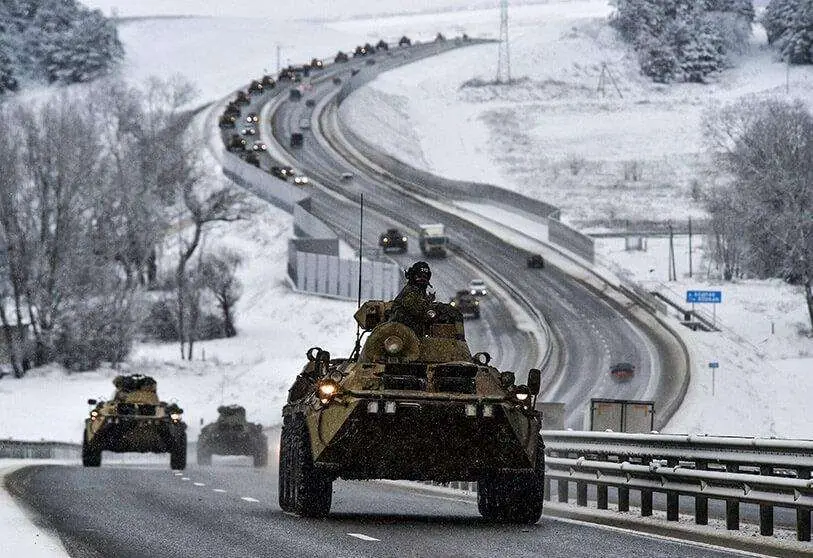Some personal considerations on the Russian-Ukrainian conflict

I never thought that Russia would invade Ukraine, a disproportionate and irresponsible decision in my opinion, not only because it seems to be a checkmate to the necessary respect for sovereignty, but mainly because it is a major strategic mistake. My first reaction was to remember Umbral when he wanted to talk about his book. I also wanted to express my ideas, based on half a century dedicated to the study of violence and conflict, although in this case the facts did not coincide with what I had envisaged. My bewilderment proved once again that common sense is the least common of senses.
Of course, Russia's military might is overwhelmingly greater than Ukraine's - "the big fish eats the small fish" - but its invasion is a needless mess that will only lead to trouble: Ukraine is a nuisance. Hence I thought he would just humiliate them, tickling them where it bothers him most: a) through air strikes, sending missiles and bombing, b) cyber-attacks against critical infrastructure, and c) squeezing its economy (Ukraine is 2nd in the world in manganese and iron, 7th in coal, and 1st in Europe in uranium, titanium and mercury), its industry (4th in the world in rocket launchers, 9th in defence material,1st in Europe in ammonia, 3rd in nuclear power plants and railway network, and 4th in natural gas), and its agriculture (1st in the world in sunflower, 2nd in barley and maize, 4th in potatoes, 5th in rye and bees, 8th in wheat and 9th in eggs)....
He hoped for a more successful outcome: a dialogue with concessions acceptable to both sides: Ukraine would offer an indefinite moratorium on NATO membership, and Russia would limit itself to occupying Donbas and, at most, as it has done, occupying the southern strip to close the exit to the sea to the east and south. Let us not forget that the Dnieper River separates two very different Ukraine: the eastern Ukraine, inhabited by Russian-speaking Orthodox separatists, and historically the origin of Greater Russia; the western Ukraine, which is Ukrainian-speaking, Catholic and comes from the Austro-Hungarian Empire.
And what is China's attitude to this Russian decision? Mere rhetorical support for its neighbour Russia, winking at it, as it has its own interests, mainly focused on an Asia-Pacific geopolitics that does not allow it to antagonise either the US or Japan, not to mention its New Silk Road, which passes through neighbouring Kazakhstan. This is not to say that it will avoid supporting Russia in the future - it is probably already the leading technological power and aims to replace the United States as the leading power in the bipolar world in which we live - but it does not seem the most opportune moment to draw Russia into its economic orbit. It goes without saying that, in such a case, Russia would be protected under its wings.
Foreseeable consequences:
1st Historical experience points to an awakening of hostile feelings of resistance towards the invader, with a resurgence of guerrilla warfare, in which I fear the Ukrainians would be more effective than Russian tanks.
2. Economic sanctions have a high probability of triggering an undesirable boomerang effect against those who impose them:
1. Russia appears to have sufficient reserves not to be necessarily dependent on the dollar, euro and yen; even if necessary, it could probably rely on China to alleviate the restrictions imposed on it. Moreover, expulsion from the SWIFF system also makes it more difficult for its legitimate Western creditors to recover the money.
2. The gas war will greatly affect prices because, for example, it is not the same to bring it in via pipelines as it is to bring it in by ship from, say, the US. In particular, the closure of Nord Stream II will perhaps have a more negative impact on those who close it -Germany- than on Russia, which is the one to be punished, since its eventual medium-term gas and oil needs would be conveniently compensated by China.
3. With regard to Spain, the sanctions imposed by the West could cause enormous economic damage to our country:
a. Energy, especially given our current policy of decommissioning nuclear power plants.
b. Industrial.
c. And mainly agricultural, for it is not for nothing that Ukraine is known as "the breadbasket of Europe".
In conclusion, we are already in a spiral inflation, and, as unfortunately always happens, the "payers" will be us, the ordinary citizens.
Jesús Martín Ramírez, Director of the Nebrija-Santander Chair on Risk and Conflict Management at Nebrija University
